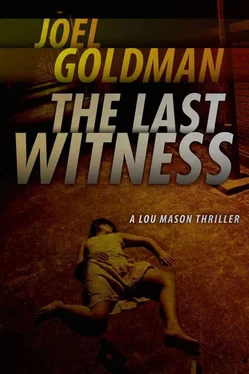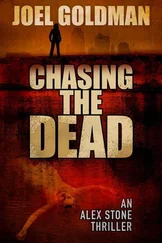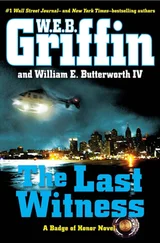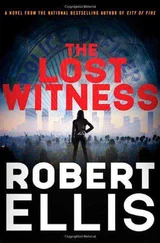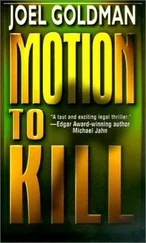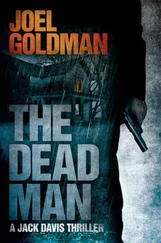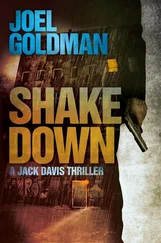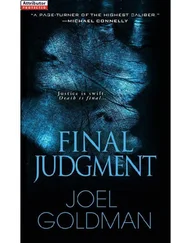Joel Goldman - The last witness
Здесь есть возможность читать онлайн «Joel Goldman - The last witness» весь текст электронной книги совершенно бесплатно (целиком полную версию без сокращений). В некоторых случаях можно слушать аудио, скачать через торрент в формате fb2 и присутствует краткое содержание. Жанр: Триллер, на английском языке. Описание произведения, (предисловие) а так же отзывы посетителей доступны на портале библиотеки ЛибКат.
- Название:The last witness
- Автор:
- Жанр:
- Год:неизвестен
- ISBN:нет данных
- Рейтинг книги:4 / 5. Голосов: 1
-
Избранное:Добавить в избранное
- Отзывы:
-
Ваша оценка:
- 80
- 1
- 2
- 3
- 4
- 5
The last witness: краткое содержание, описание и аннотация
Предлагаем к чтению аннотацию, описание, краткое содержание или предисловие (зависит от того, что написал сам автор книги «The last witness»). Если вы не нашли необходимую информацию о книге — напишите в комментариях, мы постараемся отыскать её.
The last witness — читать онлайн бесплатно полную книгу (весь текст) целиком
Ниже представлен текст книги, разбитый по страницам. Система сохранения места последней прочитанной страницы, позволяет с удобством читать онлайн бесплатно книгу «The last witness», без необходимости каждый раз заново искать на чём Вы остановились. Поставьте закладку, и сможете в любой момент перейти на страницу, на которой закончили чтение.
Интервал:
Закладка:
Margaret scanned Mason's card collection like a bouncer checking for fake IDs. "You didn't sign the back of your bar card. I can't accept it without a signature," she said, handing the bar card back to Mason.
Mason felt the first wave of intemperance ripple through his back and neck. He resisted the urge to vault the counter separating them and smiled instead.
"Of course. Sorry about that," he said as he signed his name and handed the card back to her.
Margaret held the bar card alongside Mason's driver's license, comparing the two signatures like a Treasury agent looking for counterfeit twenties.
"Bar card is expired. Can't take an expired bar card. You should have paid your dues."
She handed the bar card back to Mason. He gripped the counter with both hands to keep them from her throat and decided to appeal to her sense of reason.
"Margaret, consider what you're saying. The bar card only means that I'm a member of the Missouri bar. It's a form of identification. There's nothing in the law that requires me to belong to the bar association or even be a lawyer to visit an inmate. Now, it happens that I am a lawyer and I have a client who's locked in a cell upstairs who is entitled to the effective representation of his chosen counsel. If he's deprived of that representation because you won't let me see him, the judge will have to dismiss the charges. My client happens to have been charged with murder, which most people think is a pretty serious deal. So why don't you call the prosecuting attorney and tell him that his case is going to get dismissed because you, Margaret, are refusing to let me see my client because my bar card has expired?"
"Jeez. Are you a tight-ass or what? I'm just doing my job here. Pay your damn dues like everybody else."
"Trust me, Margaret. I've paid my dues. Now, open up."
Mason passed through a series of security checks that fell one pat down short of a body-cavity search and was ushered into a cramped room divided by a narrow countertop that served as a table. A reinforced double pane of glass cut the room completely in two. A circular metal screen was mounted in the glass, which allowed conversation to be heard on both sides.
Mason stood, pacing in the small room until Blues entered through a door on the inmates' side. They looked at each other for a full minute. Mason saw a defiant man, ramrod straight, ragged coal black hair hanging over his tawny brow, piercing eyes searching Mason for good news. Blues touched his closed fist to the glass, holding it there, Mason returning the gesture.
"They're going to offer you a deal."
"I won't take it."
"I know that."
"How do you know they're going to offer me a deal?"
Mason couldn't tell Blues what had happened in the parking lot. If Blues knew that taking a deal would protect Mason, he might agree. Mason assumed that whoever had sent him the message was counting on his relationship with Blues as one more source of pressure that would bring this case to a quick conclusion.
"Patrick Ortiz invited me to his office to talk about it. I turned down the invitation. Are you ready to ride this thing out?"
"All the way. I'm innocent and I'm not going to let somebody railroad me. Besides, no matter how many of them there are, you and me got them outnumbered."
Mason smiled at the vote of confidence. "This case is hot and it's going to get hotter. You watch yourself in there."
Blues chuckled. "Man, you forget one thing. All those brothers and white-trash crackers in there are afraid this crazy Indian will scalp 'em in their sleep. No one is going to fuck with me. Not more than once."
"Be cool, Blues. The case they've got against you isn't worth a shit. Don't give them one they can make."
"I hear that."
They touched their fists against the glass again, and Mason pushed a button signaling the guard that they had finished their meeting.
CHAPTER EIGHTEEN
When Mason got back to his office, he listened to a message from his aunt Claire telling him to meet her for lunch at the Summit Street Cafe at noon. It wasn't an invitation. It was an order. She wasn't much for protocol.
Mason assumed that she wanted to talk about Blues's case. If he was caught in the middle between Harry and Blues, she was caught between him and Harry. Though she wouldn't see it that way. She was one of the few people Mason knew who meant it when she said, "Let the chips fall where they may."
He had time until lunch so he searched the Kansas City Star's Web site for Rachel Firestone's articles about Jack Cullan's murder, noting that there had been three other murders during the same span, none of them getting the same coverage and none of them generating any fanfare or outrage. Mason knew why.
Kansas City knows murder. Any town that began as a river trading post called Old Possum Trot knows killing. Any town that claims Jesse James as a wayward son and commemorates the Union Station Massacre knows how to let the lead fly. Any town that has convulsed with riots and raised a generation of hopeless hard cases who expect to die before they're twenty-five knows the sweet agony of death.
Put a million and a half people-white, black, brown, yellow, rich, poor, faithful, faithless, doped, dependent, and demanding-in the rolling river country of the heart of America and they'll find endless ways to kill. Put it in the papers and on the news with candlelight vigils for the funerals of infants. Watch as TV reporters stick microphones in mourners' faces asking how does it feel and the people will search themselves for shock while keeping a head count, a steady drumbeat of death, ahead or behind last year's pace.
But take the life of a mover and a shaker, of one to whom it's not supposed to happen, someone who holds all the cards, someone who gives more dispensations than the pope and holds more markers than the devil. Well, that's showbiz. The mayor grieves the victim and denounces the guilty. The chief of police reassures an anxious community with a quick arrest, and the prosecuting attorney promises justice swift and certain.
Rachel Firestone reported it all. Her prose was concise, her tone neutral, and her facts straight. Only the headlines above the stories announced an agenda. They painted the crime, the victim, the accused, and the supporting cast with a broad brush dipped in sensational ink to capture mind share and market share in a media-saturated world. Kingpin Murdered, screamed the headline in Tuesday's paper. Wednesday's lead promised Police Close to Arrest, and Thursday's paper trumpeted Ex-Cop Arrested for Murder of Political Boss.
None of the stories added to Mason's knowledge of the case. He ran a search for articles on the Dream Casino, printed them, and began reading.
Missouri had been a late entrant in the sweepstakes for gambling dollars. Bible Belt morality had kept the casino interests out of the state for decades, though Kansas City had been a wide-open town from the beginning of the twentieth century through Prohibition. Gambling had flourished in speakeasies all over town, particularly along the Twelfth Street strip from Broadway to city hall. Tom Pendergast had been the boss in those years, running his empire of influence and muscle under the guise of a concrete business.
A coalition of clergy, political reformers, and the IRS had brought Pendergast down, and Kansas City settled into a long period struggling with its lingering reputation as a cow town, unable to compete with the temptations offered on a grander scale by bigger cities.
The gaming people had seen opportunity on the Missouri and Mississippi Rivers. They sold the state legislature on a scam that would have shamed even Professor Harold Hill with its Music Man audacity.
They promised gambling on riverboats reminiscent of Mark Twain's paddleboats; two-hour cruises with five-hundred-dollar loss limits to ensure that no one would lose the rent money. To prove they were good citizens, they offered to fund programs for problem gamblers and suggested that their tax revenue be dedicated to education. The legislature doubled down and took the bet, offering the voters an amendment to the state's constitution legalizing riverboat gambling on the Missouri and Mississippi Rivers. The voters couldn't wait to cash in.
Читать дальшеИнтервал:
Закладка:
Похожие книги на «The last witness»
Представляем Вашему вниманию похожие книги на «The last witness» списком для выбора. Мы отобрали схожую по названию и смыслу литературу в надежде предоставить читателям больше вариантов отыскать новые, интересные, ещё непрочитанные произведения.
Обсуждение, отзывы о книге «The last witness» и просто собственные мнения читателей. Оставьте ваши комментарии, напишите, что Вы думаете о произведении, его смысле или главных героях. Укажите что конкретно понравилось, а что нет, и почему Вы так считаете.
